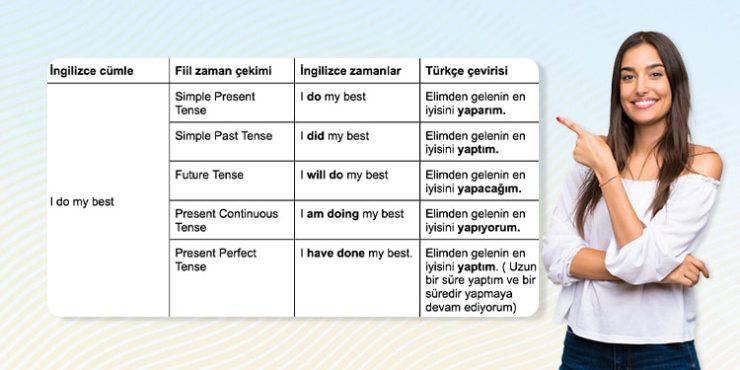

SIMPLE PRESENT TENSE
Tekrarlanan Eylemler
Bir eylemin tekrarlandığının veya olağan bir şey olduğunu belirtmek için Simple Present kullanılır. Bu eylem bir alışkanlık, hobi, günlük iş veya programlı bir aktivite olabilir. Tam tersi yapılmayan veya tekrarlanmayan eylemler için de kullanılır.
v It takes me five minutes to get to school
v I go to dentist every six months
v Each summer we go to Antalya for a holiday.
v She has a cup of coffee during breaks
Evrensel Gerçekler ve Genellemeler
Simple Past
Geçmişte belirli bir zamanda (last year, yesterday, two weeks ago gibi) olan eylemleri anlatmada Geçmiş Zaman (Simple Past Tense) kullanılır.
v Bill Clinton was in Turkey in 1999.
v I was in Europe two months ago
v The soldiers were in their barracks at six o’clock.
v We played tennis last week.
v They talked to Mr Gibs last Monday.
v Ali came to visit me last July
v How many books did you read last month?
v When / what time did it start snowing?
v How many students did the teachertalk to?
v Yılmaz was sick yesterday evening
v I saw her when/while I was in İzmir
v We met on Sunday.
*** When ile yapılan sorularda daima Simple Past kullanılır.
v When did you see the film?
Simple Past Kullanılan Yapılar:
It is time I’d rather “I wish
If Clause Type I
Reported Speech
Genelde olan eylemler ve bilimsel gerçekler hakkında konuşurken Simple Present kullanılır.
v Every twelve months, the Earth circles the sun
v The sun does not circle the Earth
v Water freezes at 0 C.
v Cats drink milk.
Gelecek Zaman
Bazen gelecekte gerçekleşecek bir olayı veya eylemi Geniş Zaman (Simple Present Tense) ile ifade ederiz.
v The students go to America this summer.
v Kenneth doesn’t get a haircut today.
v Jack: When will the train leave
v Bob : It leaves at 8:15.
v
v When do you finish writing your report?(
v Do you take the final test next month?
Present Continuous (Şimdiki Zaman)
Kullanım I
Present ContinuousTense şu anda olan ya da olmayan eylemleri anlatmak için kullanılır. Now, right now, at present, presently, for the time being, currently, at the moment, at the present time en çok kullanılan zarflardır.
Örnekler:
v You are learning English now.
v We’re very busy right now
v At present my father is working abroad
v He is presently our ambassador to the United Nations
v We’ve decided to do without a car for the time being
v The Director is currently having talks in the USA
v She’s not here at the moment
Kullanım II Yakın Gelecek
Bazen yakın zamana olacak kararlaştırılmış eylemler için bu zamanı kullanırız.
Örnekler:
v I am not going to the party tonight
v Is he visiting his parents next weekend
Kullanım III Tekrar veya Yakınma “always, constantly,continuously ”
Genellikle Geniş Zaman ile gösterilen, sık sık tekrarlanan, alışkanlık haline getirilen eylemleri bildirmek için de Şimdiki Zaman kullanılabilir. Bazen konuşmacının eylemi ya da alışkanlığı onaylamadığını ya da onu sinir bozucu bulduğunu gösterir. Genellikle “always”, “continuously” veya “constantly” gibi zarflarla kullanılır.
Örnekler:
v She is always coming to class late.
v I don’t think Daniel can lose weight. He is always eating something
v He is constantly talking. I wish he would shut up .
v I don’t like them because they are always complaining
v He’s continuously changing his mind
v Nobody likes Ann at school since she is always having arguments with other students
Kullanım IV
Devamlı değişimi ifade eden ve uzun süreli olmakta olan eylemleri anlatırken kullanılır.
v Economically the country is improving steadily these past ten year
v Her health is improving rapidly
v Petroleum prices are rising these days
Future (be going to- will)
v “Will” to express a Voluntary Action (isteyerek yapılan, gönüllü eylemler)
“Will”bir kişinin bir eylemi başakası için isteyerek yapacağını belirtir. Genelde başka birinin isteğine ya da şikayetine cevap olarak yapılır.Örnekler:
v A: I’m really thirstyB: I’ll bring you some water
v A: This bag is too heavy for me to carry .B: Ok, I‘ll carry it for you.
v A: The phone is ringing .B: I’ll answer it
v “Will” to Express a Promise (Söz vermek için)”Will”söz verirken sık sık kullanılır.
Örnekler:
v I will never tell lies again.
v I will call you when I arrive
v I promise I will not tell him about the truth.
v “Be going to” to Express a Plan (Yapılan bir plan)”Be going to”kesin yapmaya kararlı olduğumuz eylemleri belirtirke kullanılır.
Örnekler:
v They are going to get married next month .
v I’mgoing to see the doctor this afternoon.
v A: Are you busy this Sunday?Answer1: Yes, I am going to meet my friend Kenan. (planlı)
Answer2: Well, I am not sure. I’ll stay home/ am going to stay home.(planlanmamış, bir tahmin)
v “Will” or “Be Going to” to Express a Prediction (Tahmin belirtirken)Hem “will” hem de “be going to” gelecek hakkında bir tahminde bulunurken kullanılır.
Örnekler:
v According to weather report, it is going to be rainy tomorrow.
According to weather report, it will be rainy tomorrow.
v I think the year 2020 will be a year full of wars
I think the year 2020 is going to be year full of wars.
v Who will be the next President?
Who is going to be the next President?
KOZAN HABERLERİ
2 gün önceYEREL HABERLER
5 gün önceYEREL HABERLER
5 gün önceDÜNYA
14 gün önceSÜRMANŞET
20 gün önceYEREL HABERLER
20 gün önceGÜNDEM
20 gün önce